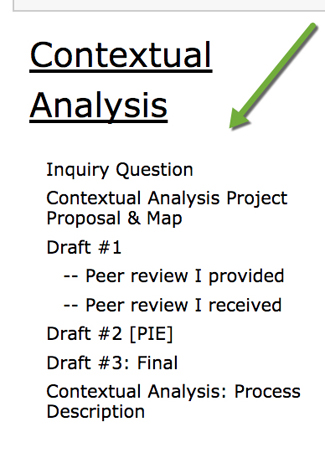We’ll add to this in class during Week 10 as needed, in our search for — and our practice of — cognitive vigilance in editing with a goal of visual & logistical coherence:
- If you’d like to change the default DePaul banner, feel free, but make your own; no stock or Google photos. Digital writing portfolio banners can be rhetorically compelling if they evoke the writer’s environment, ethos, or tone.
- Add short descriptive annotations to each project section for readers who ma
 y not be aware of how we approached, planned, and completed projects. It’s good practice to summarize the assignment and your approach to it.
y not be aware of how we approached, planned, and completed projects. It’s good practice to summarize the assignment and your approach to it.
- Confirm that all elements of your Contextual Analysis Project are accounted for and easily accessible.
- Where to put your Process Description? As a page in your reflective essay, where you can link to it? Or in your contextual analysis section, where can also link to it?
- Confirm that your previous work is edited and proofread, with a serif font and appropriate white space for readability.
- Main “home page” should introduce you and your work. The rhetoric of a portfolio home page is that it announces the successful completion of WRD104; include enough overview and guidance such that readers know what to do after reading it, and why.
After-class updates, Monday:
- Work the critical-thinking angle — feel free to quote directly from this, http://composing.org/wrd104sq2015/a-well-cultivated-critical-thinker/ — so that you can tell us about how it applies to you; how, when, and where you rose to a critical-thinking challenge in our class; and where you see critical thinking fitting in your life overall. (I’m attaching a red pill if you need it.) Remember, “good writing” is not only clean grammar and mechanics — it’s the result of ongoing, rigorous, critical & reflective thinking.
- If you don’t have a wolf sentence in your final draft, then use your portfolio as a safety net: address it there — what do your sources’ values, positions, ideologies, and rhetorical strategies tell you about your inquiry question and issue? (“Every wolf in Yellowstone therefore is more than just a wolf. Imbued with profound symbolic meaning, each wolf embodies the divergent goals of competing social movements involved in the reintroduction debate.” — http://composing.org/wrd104sq2015/every-wolf-in-yellowstone-therefore-is-more-than-just-a-wolf/)
- What kind of reader are you? What kind of reader do you want to be? What role does reading play in your life? Arthur Miller — ‘A good newspaper, I suppose, is a nation talking to itself.’
After-class updates, Wednesday:
- David Brooks, right on schedule, delivers a great way to think about critical thinking — even though he doesn’t call it that: “The Campus Crusaders.” We won’t have time to read through or discuss it in detail, even though it’s a great Letter to the Editor candidate, but, rather, I would like to focus on one sentence, which can play a major role in your reflecting about critical thinking in your portfolio: http://composing.org/wrd104sq2015/brooks-reality/. It’s really a great sentence and prompt.
- Also, as you prepare for the next 10 days of finals, papers, and projects: http://www.buzzfeed.com/erinchack/studying-hacks-for-finals-week#.cxB9QjZ03p — I can vouch for numbers 8, 10, 11, 14, 15, and 16.
